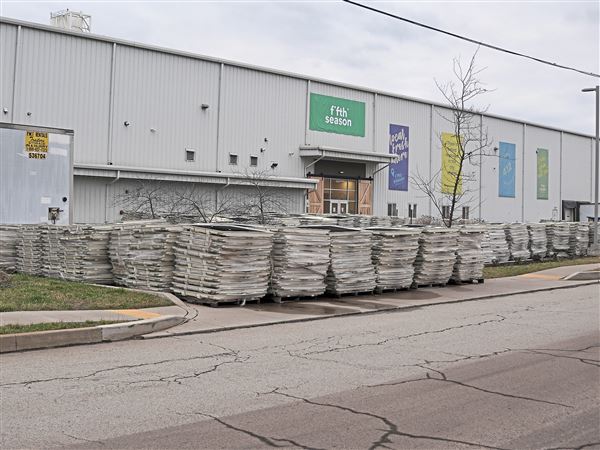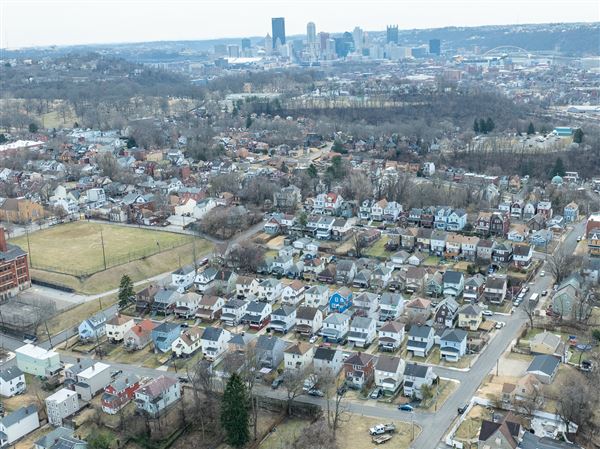Apple Avenue was once a destination, and a clutch of preservationists hope it will be again.

Woogie Harris' house, at 7101 Apple Ave. in Homewood, circa 1950. It was the birthplace of America's first black opera company as well as temporary home of jazz singer Lena Horne and baseball great Roberto Clemente.
Click photo for larger image.
The 113-year-old Queen Anne-style house at 7101 Apple in Homewood served a prodigious cast, from the Depression-era numbers king William "Woogie" Harris, who owned it, to the founder of the National Negro Opera Company, who lived in it and ran her school and company in it; from the jazz singer Lena Horne to Pirates great Roberto Clemente, both of whom rented rooms there.
It now stands with a leaky roof, unstable porch, boarded windows and a new historic dedication marker to replace one that disappeared earlier this year. The new marker will be dedicated today at an 11 a.m. public ceremony, sponsored by the Young Preservationists Association of Pittsburgh and the Pennsylvania Historical Museum Commission.
Dan Holland, founder and chair of the YPA, said the event is also a cry for help.
"I'm hoping to call attention to the need for its restoration," he said. "I would expect this would be of interest to major foundations in Pittsburgh."
The current owners, Jonnet Solomon-Nowlin, a native of Guyana who lives in Mount Washington, and Miriam White of Homewood, have formed a nonprofit corporation, The National Opera House, to secure funding for an almost $2 million rehabilitation, but they need $200,000 immediately to repair the roof and porch. The nonprofit has a board, a business plan and a strategic plan for which it consulted with Duquesne University's Small Business Development Center.
"We want to make it an art center," said Ms. Solomon. "We bought it [in 2001] because it was sitting there falling apart, and we didn't want to let it disappear with no one knowing its history."
The women consulted with the late Peggy Pierce Freeman, a protege of Mary Cardwell Dawson, founder of the National Negro Opera Company.
"We were trying to push something forward before she passed" last year at age 83. "We have had a huge learning curve to overcome, because neither of us has ever done anything like this.
"We have spent a significant amount to secure the property," said Ms. Solomon.

The original historical marker at the National Negro Opera Company (from 2006). Above, the house as it appeared in 1994.
Click photo for larger image.
When the National Negro Opera Company based its headquarters and audition studios there, its casts were performing nationwide to such acclaim that an editorial in the Pittsburgh Courier lamented its financial insolvency this way: "How easy it would be for one of the many foundations in Pittsburgh to underwrite such an effort as hers with a yearly grant of $10,000. Such a grant would allow her to eradicate quickly all imperfections. This would be a cheap price to pay, for a few years, for what Mrs. Dawson can contribute to our cultural renaissance."
The gray, stuccoed, three-story frame would be retrofitted for cultural activities, including a music studio and tea room, Mr. Holland said.
Woogie Harris, whose brother was Pittsburgh Courier photographer Teeny Harris, had become wealthy and influential when he bought the house in what was mostly a white, middle-class Homewood in the 1930s.
In 1941, Mrs. Dawson founded the opera company, the first black opera company in the country. The Apple Avenue house was its home from the late 1940s until it disbanded in 1962, when Ms. Dawson died.
The structures of Pittsburgh's black history have been disappearing at an alarming rate, a fact Mr. Holland has reiterated for years. The year he formed the YPA, in 2003, the house on Apple was on the "top 10" list that has been posted each year since.
In 1994, the Heinz History Center and Mr. Holland collaborated to get the first historical marker.
First Published: May 3, 2007, 3:45 a.m.















